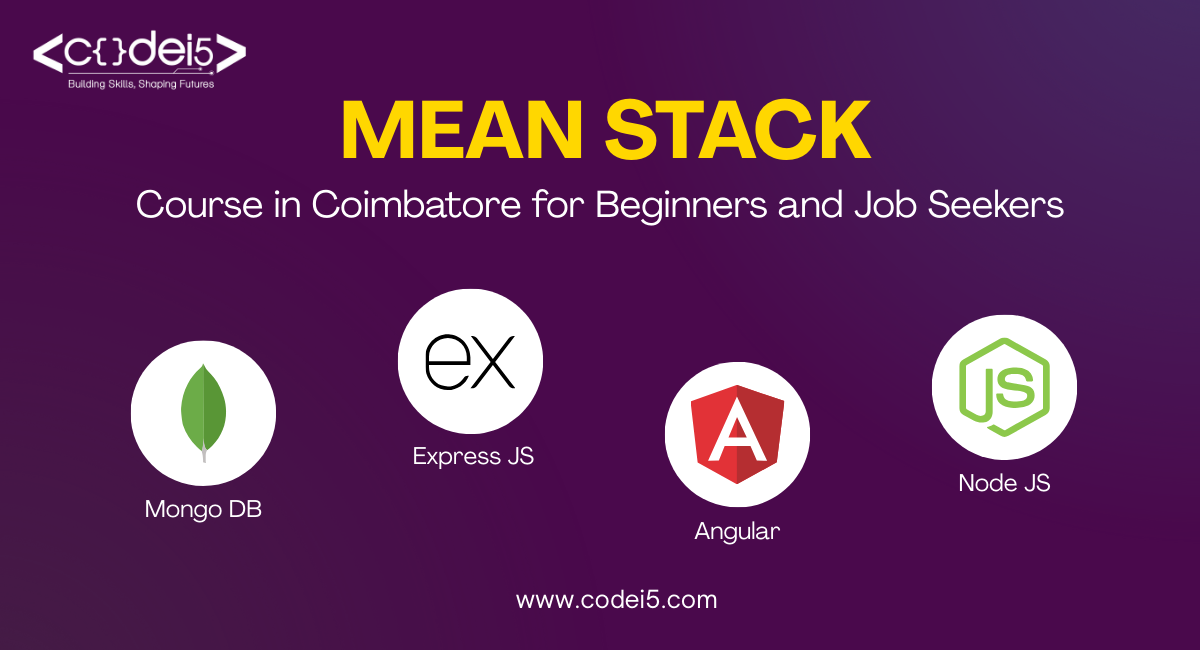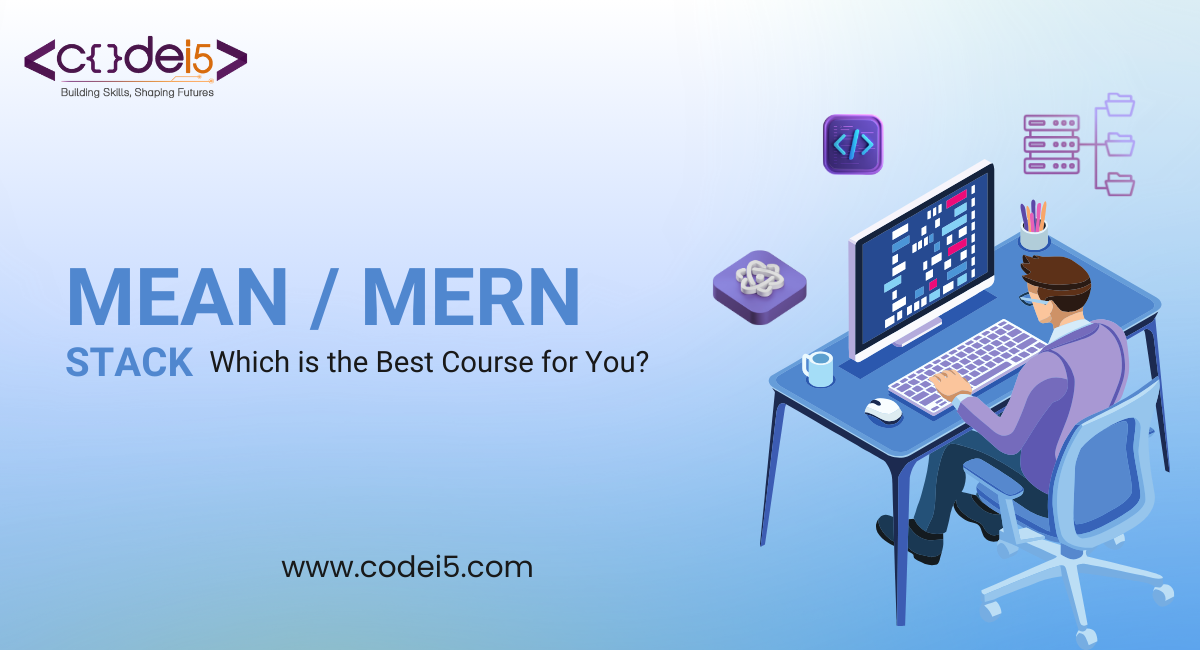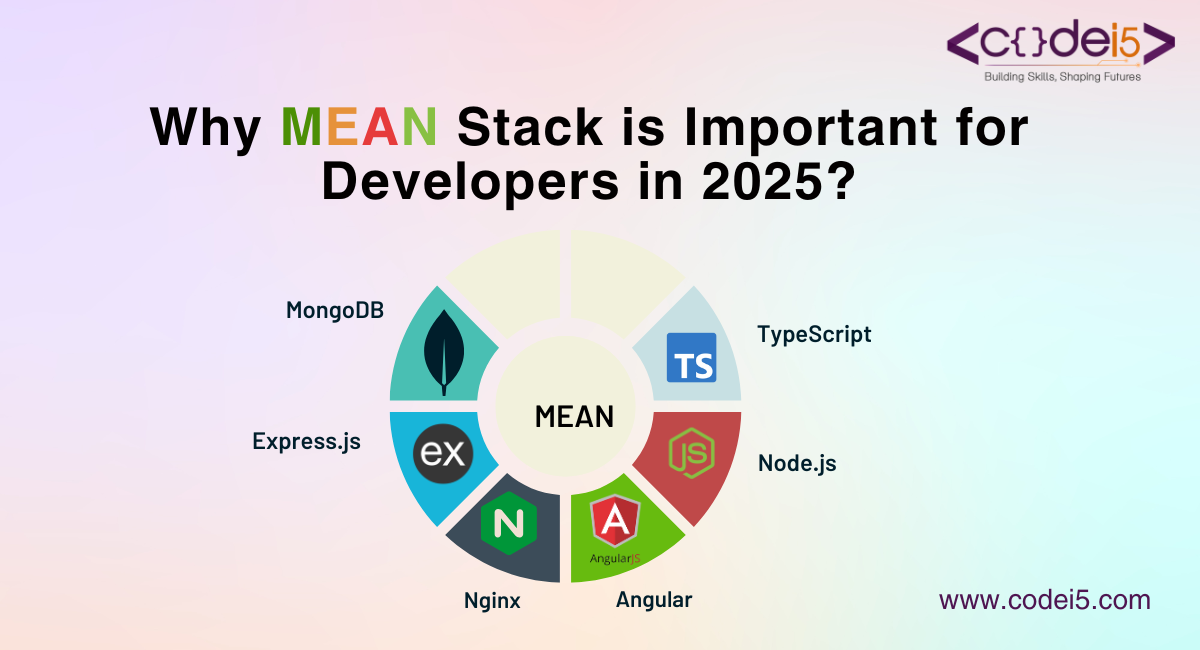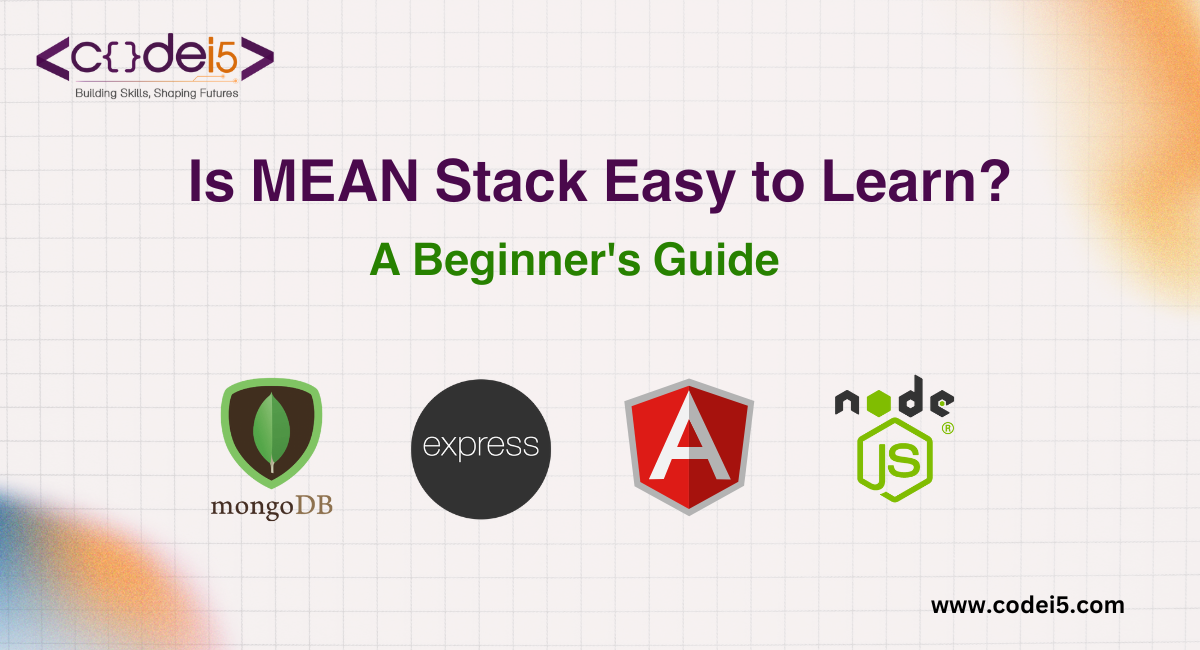MEAN Stack Development: The Ultimate Learning Path for Beginners
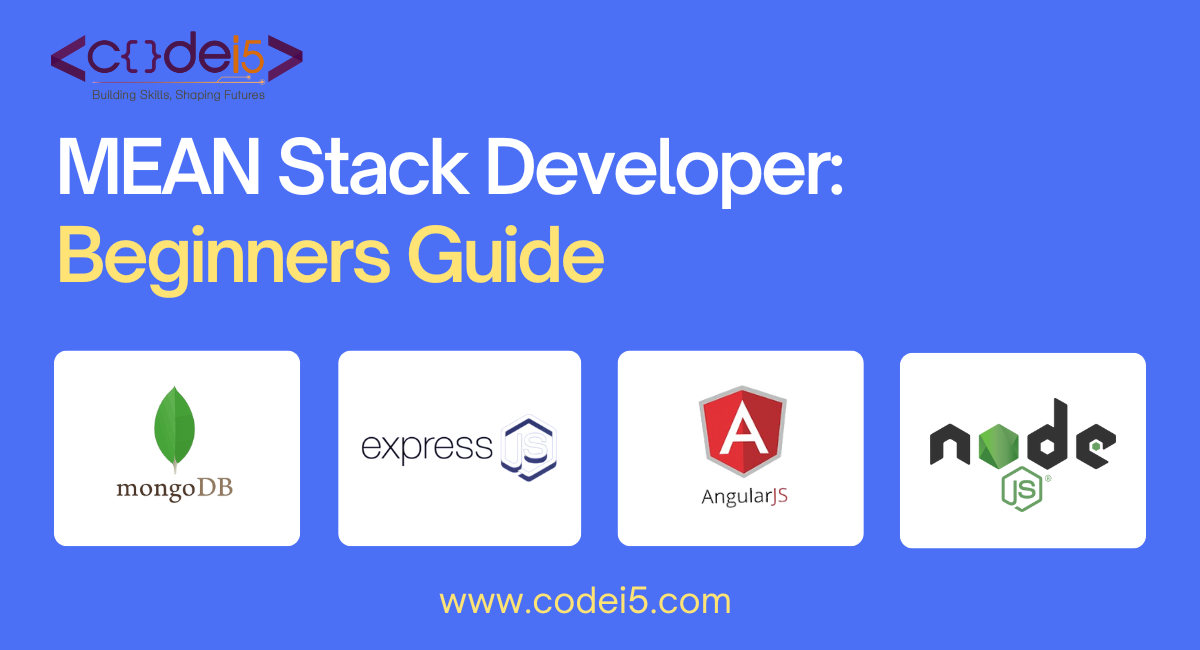
Within the broad field of web development, there is a game-changing technological stack called the MEAN stack that draws in novices with its claims of innovation, scalability, and easy integration.
The MEAN stack, which consists of Node.js, AngularJS (or Angular), Express.js, and MongoDB, is a comprehensive ecosystem for creating dynamic web applications that only use JavaScript. Building reliable, scalable apps is made easier with the help of the potent MEAN Stack Development framework, which is used in modern software development.
Explore in-depth the fundamental ideas and methods that form the foundation of the MEAN stack architecture. We walk you through every stage of the development process, from using MongoDB for data storage and processing to Express.js and Node.js for building reliable server-side apps. Along the way, we skillfully combine client-side functionality with server-side logic by utilizing Angular’s power to develop visually stunning user interfaces.
What is the MEAN Stack?
A group of JavaScript-based technologies called the MEAN stack is employed in the development of dynamic web applications. The acronym MEAN represents the following:
MonoDB- a NoSQL database that is extremely versatile and scalable for managing massive volumes of data since it stores data in a format similar to JSON. MongoDB is renowned for being user-friendly and having the capacity to handle unstructured data.
Express.js– a straightforward and adaptable Node.js web application framework for creating online apps and APIs. Express.js offers a comprehensive collection of tools for routing, middleware, and managing HTTP requests and answers, which makes the process of developing server-side applications easier.
Angular (AngularJS)- a Google-maintained front-end JavaScript framework for creating dynamic and interactive user interfaces. With features like data binding, dependency injection, and modular development, Angular makes it easier to create rich user experiences for single-page applications (SPAs).
Node.js- a JavaScript runtime for servers based on the V8 JavaScript engine seen in Chrome. With Node.js, developers can run JavaScript code outside of a browser and create server-side apps that are highly performant and scalable.
The MEAN stack, which consists of these four technologies, provides a full-stack JavaScript solution for creating contemporary online applications. A single programming language (JavaScript) can be used by developers throughout the entire process thanks to the MEAN stack, which speeds up development and promotes code reuse on both the client and server sides.
What is the purpose of the MEAN stack?
The MEAN stack’s goal is to give programmers a complete, integrated toolkit of technologies so they may use only JavaScript to create cutting-edge online apps. The following are the main goals and benefits of utilizing the MEAN stack:
Full Stack JavaScript Development: With MEAN, developers can create client-side (front-end) and server-side (backend) applications using JavaScript, saving them from having to transition between many programming languages.
Scalability and Flexibility: The MEAN stack—which consists of Node.js, Angular, Express.js, and MongoDB—is flexible and scalable, making it ideal for managing massive amounts of data and adapting to changing needs in online applications.
Rapid Prototyping and Developing: With the help of technologies like Express.js’s middleware system and Angular’s two-way data binding, developers can create feature-rich web apps more rapidly, thanks to MEAN’s lightweight and modular architecture.
Ismorphic JavaScript: MEAN makes it easier to write JavaScript that is isomorphic or universal, meaning that it can execute on the client and server sides. This shortens development time and improves performance by allowing developers to exchange logic and code between the front-end and backend.
Community and Ecosystem: With a thriving and active developer community, the MEAN stack offers a wealth of tools, tutorials, and documentation for each component.
The MEAN stack’s overarching goal is to enable developers to effectively create cutting-edge, scalable, and high-performance online apps by utilizing JavaScript’s capabilities throughout the whole development stack.
Why master MEAN stack knowledge?
Both aspiring and seasoned engineers can gain a great deal from learning the MEAN stack. The following are strong arguments in favour of learning the MEAN stack:
Full-stack proficiency: Gaining an understanding of the MEAN stack gives you the ability to use JavaScript to create web applications’ front-end (client-side) and backend (server-side) components.
Simplified development workflow: Because the MEAN stack uses JavaScript as its primary programming language, you may simplify your development process. This results in fewer context switches, increased code reuse, and enhanced teamwork, all of which accelerate development cycles and boost output.
High Demand in the Industry: Because full-stack development frameworks are becoming more and more popular and JavaScript is widely used, MEAN stack developers are in great demand. Employers in a range of sectors are looking for qualified MEAN stack developers to create data-driven, scalable, and real-time online apps.
Modern and Scalable Architecture: Because of its scalability and flexibility, the MEAN stack is ideal for developing contemporary web applications that can manage massive data loads and adapt to changing needs.
Access to Vibrant Ecosystem: With a thriving and active developer community, the MEAN stack offers a wealth of tools, tutorials, and documentation for each component. A wide range of reusable modules and libraries are also available in the npm (Node Package Manager) ecosystem, which boosts productivity and expands the functionality of MEAN-based apps.
Career Advancement Opportunities: Gaining knowledge of the MEAN stack increases your chances of advancing professionally in the quickly changing web development industry. Being proficient in the MEAN stack will greatly improve your employment prospects, regardless of your career goals. These roles can range from junior developer to full-stack developer, software engineer, or technical lead.
Mastering the MEAN stack increases your employability and career chances in the fast-paced industry of web development while equipping you to create cutting-edge, scalable, and high-performance web apps.
How can one master the Mean Stack?
Being proficient in each of the four components of the MEAN stack—Express. Js, Angular, Node.js, and MongoDB—is a prerequisites for learning the stack. An organized method for mastering the MEAN stack is as follows:
Familiarize yourself with Javascript.
- Make sure you comprehend the fundamentals of JavaScript, including variables, data types, functions, control flow, and the ideas behind object-oriented programming.
- Build a solid foundation by developing JavaScript code as a practice before tackling MEAN stack development.
Learn Node.js:
- Learn the server-side JavaScript runtime environment, Node.js, first.
- Examine event-driven design, asynchronous programming, and the Node.js module system.
- To learn about the fundamental ideas and functionalities of Node.js, create basic server-side apps.
Understand Express.js:
- Examine Express.js, a Node.js framework for creating simple online applications.
- Discover Express.js’s routing, middleware, request processing, and template engines.
- Construct web servers and RESTful APIs with Express.js to build the backend of MEAN stack applications.
Master MongoDB:
- Learn how to utilize MongoDB, a NoSQL database that is used in MEAN stack apps for data management and storage.
- Discover more about MongoDB’s document-oriented data storage, CRUD functions, indexing, and aggregation.
- Use the MongoDB Compass, MongoDB Shell, or a programming language driver like as Mongoose for Node.js to practice dealing with MongoDB.
Explore Angular:
- Explore Angular, an advanced JavaScript front-end framework for creating single-page applications (SPAs).
- Discover more about the routing, forms, data binding, modules, services, and components of Angular.
- Utilizing Angular, create dynamic and interactive user interfaces to round off the front end of MEAN stack apps.
Build Mean Stack Applications:
- Utilize your understanding of Angular, Node.js, Express.js, and MongoDB to create full-stack MEAN applications.
- As you develop confidence, start with simpler projects and progressively expand in complexity.
- Try out various features, tools, and libraries to improve your comprehension of the ecosystem surrounding the MEAN stack.
Practice and Build Projects:
- Develop projects that make use of the MEAN stack technologies on a regular basis.
- To obtain real-world experience, work on your projects, contribute to open-source initiatives, or team up with others.
- Try putting MEAN stack apps on hosting services such as DigitalOcean, AWS, or Heroku.
Stay Updated and Engage with the Community:
Keep yourself updated about changes, new features, and best practices within the MEAN stack ecosystem by reading through the official guides, blogs, tutorials, and discussion boards.
Participate in the MEAN stack community by using social media, conferences, meetups, and online forums to share your experiences, ask questions, and exchange ideas.
You can study the MEAN stack and start a fulfilling career in full-stack JavaScript development by following these steps and keeping a hands-on learning approach.
Discover the ultimate learning path for beginners in website development with our comprehensive MEAN Stack Development course.
Conclusion:
Finally, MEAN Stack Development gives newcomers the best possible learning path by giving them a thorough overview of Angular, Node.js, Express.js, and MongoDB. With practical experience, supervised lessons, and real-world projects, students can gain the fundamental knowledge needed to develop contemporary web apps. Beginners can explore countless opportunities in full-stack JavaScript programming by adopting the MEAN stack, which enables them to start a fulfilling career in the exciting field of web development. At our training institute, beginners can embark on the ultimate learning path for MEAN Stack Development.


